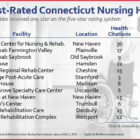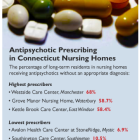I-Team In-Depth
Staffing Levels, Culture Challenge Quality Of Nursing Home Care
|
In 2018, the state took the unusual step of issuing a consent order requiring a New Haven nursing home to hire an independent nurse consultant and implement minimum staffing ratios after inspections at the facility uncovered numerous lapses in care and safety violations. The order, agreed to in April by the Advanced Center for Nursing and Rehabilitation and the state Department of Public Health (DPH), tasked the independent nurse consultant with assessing the staff’s ability to do their jobs and evaluating how care is delivered. The minimum staffing ratios ordered are 30 patients to one licensed nurse on all shifts, on most units; 10 patients to one nurse’s aide on the first shift; 12 patients to one nurse’s aide on the second shift; and 20 patients to one nurse’s aide on the third shift. Officials at the facility didn’t return calls seeking comment. It isn’t often that DPH mandates staffing or requires nursing homes to hire consultants, but the order reflects a broader emerging problem affecting the care provided at many nursing homes: insufficient staffing levels and caregivers who lack training.



